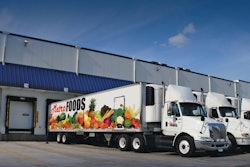
Most of us who make our living in the cold chain recognize the important role we play in society at large. Thanks to advances in food preparation, warehousing and delivery, more and better food is accessible to more people than ever before.
Sometimes we have a tendency to assume that the millions of people who depend on us also realize the importance of the work we do. After all, common sense would dictate this.
But does the public really understand just how important our role is? Do public officials who write the rules we must follow understand all of the things we do?
AFFI steps forward
The American Frozen Food Institute (AFFI) recently released a study designed to quantify the frozen food and beverage industry’s impact on the U.S. economy as well as its contribution to the economies of individual states and congressional districts.
The study, conducted by the Policy Navigation Group, found that our industry contributed $56 billion to the U.S. gross domestic product and accounted for 670,000 jobs in 49 states in 2012.
Each job in our industry supports 3.35 jobs elsewhere in the economy. Counting direct, indirect and induced economic effects, our industry’s total impact on U.S. labor income was $35 billion.
The study is important because it supports efforts to promote and improve our industry, especially in the area of government relations. The food and beverage industry is one of the country’s most strictly regulated industries. Government at all levels scrutinize the production, storage and transportation of perishable products.
“Frozen food and beverage makers and distributors in their quest to offer consumers convenient and nutritious products also make a vital contribution to communities large and small in nearly every corner of the country,” says AFFI President and CEO Kraig R. Naasz. Understanding the positive role served by frozen food and beverage makers aids our efforts to advocate for sensible policies that drive economic growth and ensure the rightful place of frozen food as part of a nutritious diet.”
Our industry supports responsible regulation. But at the same time, we must continuously apprise regulators the full role that we play in the economy. The industry today faces serious challenges in the areas of food safety, transportation and educational funding. A cooperative relationship with government has never been more important.
Our industry reaches far and wide
Due to the capital-intensive nature of frozen food production, firms in our industry buy many goods and services from other sectors of the economy. Growers provide the fruit, vegetables and other fresh foods. Frozen food companies then use refrigerated transportation, rapid truck, rail, ship, air transport, refrigeration and other machinery to create frozen foods.
Planning these logistics requires management consulting and supply chain experts. Freezing and preserving these foods requires technologically-advanced equipment, special buildings and electricity to run the refrigeration equipment.
Producers of goods and services must secure labor, raw materials and other services to produce their product. The resources transferred to the owners of that labor or those raw materials and services are then spent to secure additional goods and services or inputs to the products they sell.
All of these sectors – from the growers to the electric utility – benefit from U.S. frozen food production.
Good information for growth
The AFFI analysis creates an estimate of all this economic activity. And it details the economic relationships between government, industry, household sectors and taxes.
The information is helpful for state and regional planning agencies that design and develop transportation infrastructure improvements, which is crucial to the industry’s long-term success.
The state and regional information is also be helpful to state and regional economic development organizations. It can help them better understand how important the food and beverage industry is to their geographic market, and it can help them attract more companies to their market.
The study also affirms the important role industry associations such as AFFI play in our collective well being.
















